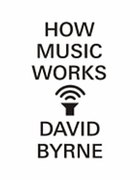
David Byrne takes a brilliant insider's look at music in How Music Works. The former Talking Heads front man brings his singular intelligence to the topic, using his own background and extensive experience to illuminate the science, practice and meaning of one of our most human of behaviors.
Byrne discusses how technology has shaped modern pop music, starting with the wax cylinder recordings of the late 1800s and continuing on to the 1970s, when electronic instruments and digital recording technologies appeared. All of these advances shaped the way musicians created and preserved their music, which in turn changed the way music sounds. Byrne's point is that no music can exist separate from its own peculiar context, regardless of its genre or the period in which it was made.
How Music Works illuminates the inner workings of modern music, from Byrne's own experience of it. He spends a chapter discussing the fine details of recording contracts, how musicians make their money (hint: it's not records any more) and the different options upcoming artists have when pursuing a career in pop or rock music.
The joy of How Music Works comes from Byrne's straightforward, no-nonsense tone. He elucidates technology, history and autobiography equally well, telling his stories with wit and charm. Readers interested in Byrne, the modern music industry and music history in general will thoroughly enjoy this book. Creating music is what makes us human, Byrne argues, and he provides an unparalleled view of how we do so. --Rob LeFebvre, freelance writer and editor

